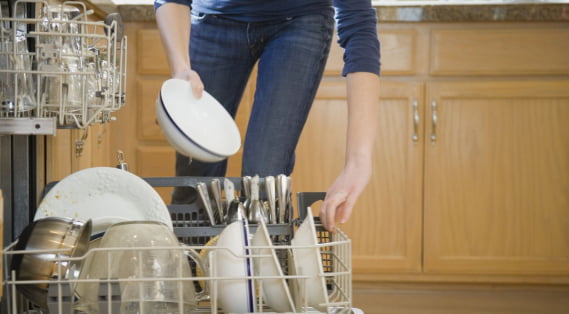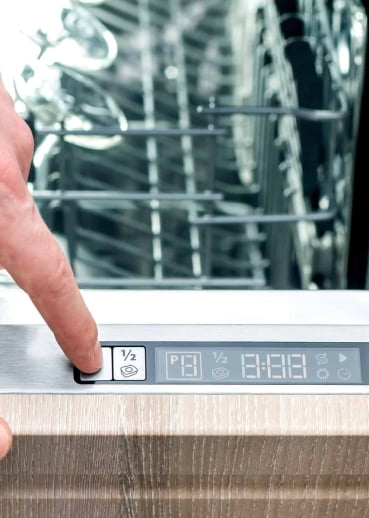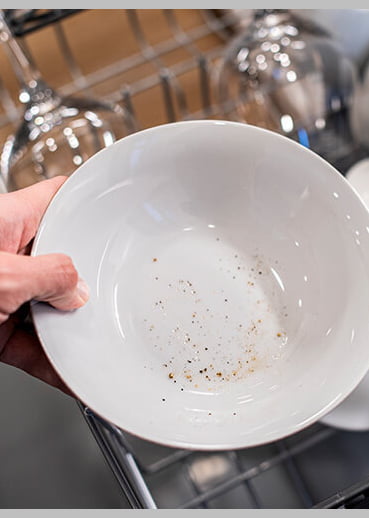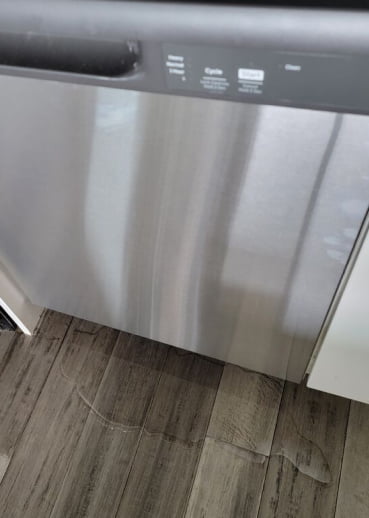A malfunctioning dishwasher can be a major inconvenience in any household. As an essential appliance for modern living, a dishwasher simplifies our daily routines and keeps our kitchen clean and organized. When it breaks down, it can disrupt the flow of our daily lives. FastAid Appliance Repair understands the importance of a properly functioning dishwasher, and we are dedicated to providing reliable solutions for common dishwasher problems. Our team of skilled technicians in Charlotte, NC, is equipped to diagnose and resolve a wide range of dishwasher issues efficiently and effectively.
In this comprehensive guide, we aim to empower homeowners with the knowledge and tools to troubleshoot and fix common dishwasher problems on their own. While some issues may require professional intervention, many can be resolved with a bit of know-how and some basic tools. Whether you're dealing with a dishwasher that doesn't start, doesn't clean dishes properly, has drainage problems, makes strange noises, or experiences other issues, our guide has you covered.
By following the guidance in this guide, you can save time and money by addressing dishwasher problems yourself whenever possible. However, for more complex or difficult issues, the FastAid Appliance Repair team is always ready to assist you. We have the expertise and experience to handle any dishwasher repair, ensuring that your appliance operates optimally and reliably.

Common Dishwasher Problems
A malfunctioning dishwasher can leave you with piles of dirty dishes and frustration. With FastAid Appliance Repair and this comprehensive guide, you can regain control over your dishwasher's performance and ensure it runs smoothly. Let's dive into the world of dishwasher troubleshooting and repairs, empowering you to become a savvy homeowner when it comes to maintaining your appliance.
Dishwasher Doesn't Start

One of the most frustrating dishwasher problems is when it fails to start. Before panicking, try these troubleshooting steps to identify and fix the issue:
- Check Power Supply: Ensure that the dishwasher is properly plugged into a working power outlet. Test the outlet using another appliance or a voltage tester to verify its functionality.
- Inspect Door Latch: The dishwasher will not start if the door is not securely latched. Check the door latch for any obstructions, debris, or damage. If necessary, clean or replace the latch.
- Reset the Control Panel: If your dishwasher has a digital control panel, try resetting it by turning off the power or pressing the appropriate buttons for a few seconds.
- Check the Timer or Delay Start: If your dishwasher has a timer or delay start feature, make sure it is not activated and set to delay the cycle.
- Examine Door Switch: The door switch is a safety feature that prevents the dishwasher from running when the door is open. Check the door switch for any damage or malfunction.
- Inspect the Power Cord: Examine the power cord for any signs of damage. If there are any issues, unplug the dishwasher and replace the power cord with a compatible one.
Dishwasher Poor Cleaning Results

If your dishwasher isn't cleaning your dishes properly, it can be frustrating and defeat the purpose of having the appliance. Here are some steps to troubleshoot and improve cleaning performance:
- Pre-Rinse Dishes: Remove excess food particles from dishes before loading them into the dishwasher. While modern dishwashers are designed to handle food residue, heavy build-ups can affect cleaning results.
- Load Dishes Properly: Ensure that dishes are loaded correctly, allowing water and detergent to reach all surfaces. Avoid overcrowding and blocking spray arms.
- Check Spray Arms: Inspect the spray arms for clogs or damage. Remove any debris or mineral deposits that may obstruct the water flow. Use the Right Detergent: Use a high-quality dishwasher detergent that is suitable for your dishwasher model. Refer to the manufacturer's recommendations.
- Check Water Temperature: Ensure that your dishwasher is connected to a hot water supply. Proper water temperature is crucial for effective cleaning. If your dishwasher has a heating element, make sure it is working correctly.
- Clean the Filter: Regularly clean the dishwasher's filter to remove trapped debris and ensure optimal water circulation.

Dishwasher Drainage Problems
A dishwasher that doesn't drain properly can leave standing water at the bottom of the appliance and cause unpleasant odors. Here's how to troubleshoot and resolve drainage issues:
- Check the Drain Hose: Inspect the drain hose for kinks, clogs, or damage. Ensure that it is properly connected to the dishwasher and the sink drain.
- Clear the Air Gap: If your dishwasher has an air gap, check for clogs or obstructions. Clean the air gap to maintain proper drainage.
- Clean the Garbage Disposal: If your dishwasher is connected to a garbage disposal unit, check the disposal for clogs or debris. Run the disposal to clear any blockages.
- Check the Drain Pump: The drain pump is responsible for removing water from the dishwasher. Inspect the pump for any clogs or foreign objects and ensure it is functioning correctly.
- Reset the Drain Cycle: Some dishwashers have a dedicated drain cycle. Run this cycle to clear any remaining water from the dishwasher.

Dishwasher Strange Noises
Unusual noises coming from your dishwasher can be bothersome and may indicate an underlying issue. Here's how to troubleshoot strange dishwasher noises:
- Inspect Spray Arms: Loose or misaligned spray arms can cause knocking or rattling sounds. Ensure they are properly secured and aligned.
- Check the Pump: A faulty pump can produce grinding or humming noises. Inspect the pump for any debris or damage.
- Examine the Wash Impeller: The wash impeller is responsible for spraying water during the wash cycle. Check for any obstructions or damage.
- Level the Dishwasher: An unlevel dishwasher can create vibrations and noise. Adjust the leveling feet to ensure the dishwasher is stable and balanced.
- Inspect the Drain Pump: The drain pump can produce loud or unusual sounds if it is faulty or clogged. Inspect the pump for debris and ensure it is functioning correctly.

Leaking Dishwasher
Water leaking from your dishwasher can lead to water damage and should be addressed promptly. Here's how to troubleshoot and fix a leaking dishwasher:
- Check Door Gasket: A damaged or worn door gasket can cause water to leak from the dishwasher door. Inspect the gasket for cracks or wear and replace if necessary.
- Inspect the Float Switch: The float switch is a safety feature that detects water level inside the dishwasher. If the switch is faulty or blocked, it can cause overfilling and leaking.
- Clean the Door Edges: Food debris or mineral deposits on the door edges can prevent a proper seal and cause leakage. Clean the door edges thoroughly.
- Check the Tub: Inspect the dishwasher tub for cracks or damage that may lead to leaks. Replace the tub if necessary.
- Inspect the Spray Arms: Loose or damaged spray arms can cause water to spray outside the dishwasher. Ensure the spray arms are properly secured.
Professional Dishwasher Repair in Charlotte, NC
While some dishwasher issues can be resolved with DIY troubleshooting and repairs, others may require the expertise of a professional technician. FastAid Appliance Repair is here to assist homeowners in Charlotte, NC, with their dishwasher repair needs. Our skilled technicians are experienced in diagnosing and resolving a wide range of dishwasher problems, ensuring your appliance functions optimally. For professional dishwasher repair services in Charlotte, NC, contact FastAid Appliance Repair today. Trust us to get your dishwasher back in working order and to provide reliable solutions for all your appliance repair needs.

